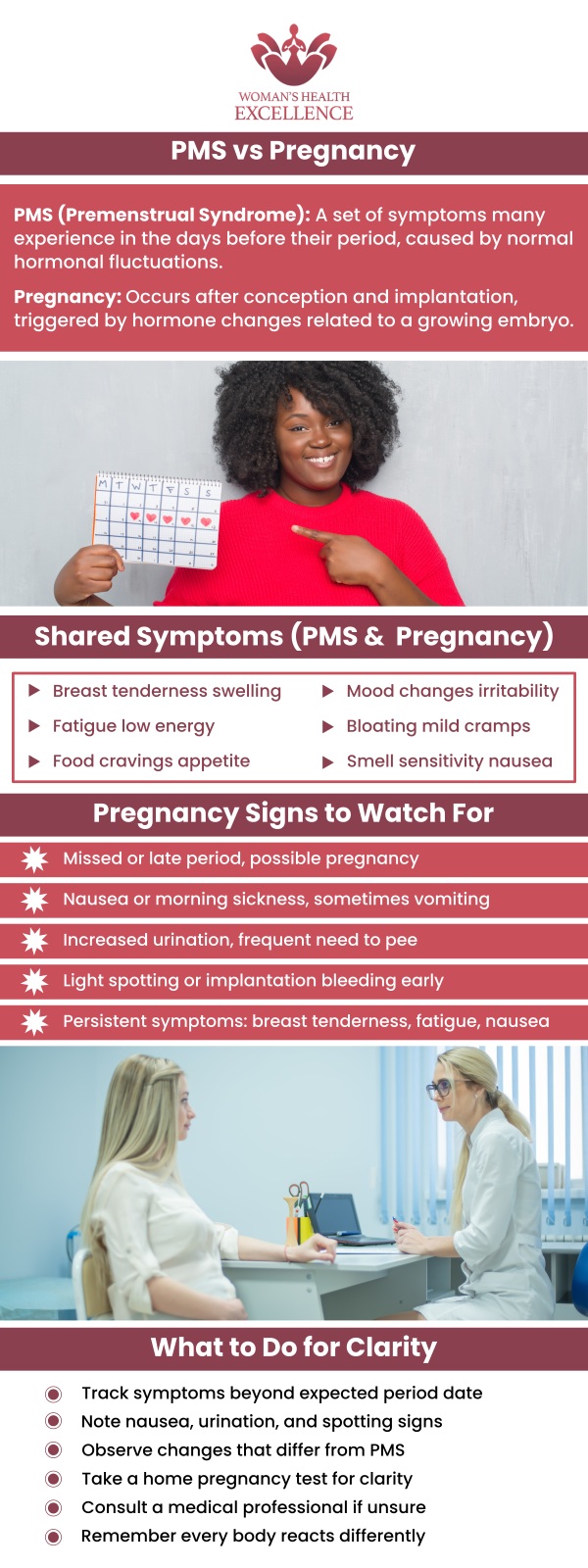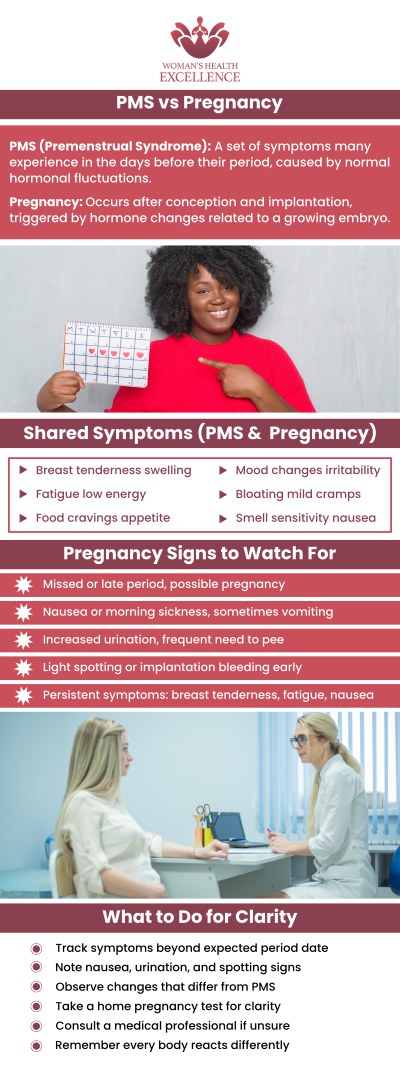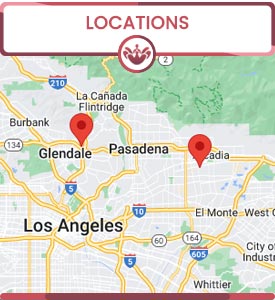PMS vs. Pregnancy Symptoms: What’s the Difference?
Understanding the difference between PMS (Premenstrual Syndrome) and pregnancy symptoms can be challenging, as they often share many similarities. Both conditions can cause bloating, breast tenderness, mood swings, fatigue, and changes in appetite, making it difficult to distinguish between the two. Know more about these differences from Dr. Prema Kothandaraman at the OB-GYN & Incontinence Center. For more information, contact us today or book an appointment online. We have convenient locations to serve you in Arcadia, and Glendale, CA.




Table of Contents:
What are the common symptoms of PMS?
What are the early symptoms of pregnancy?
How can I tell the difference between PMS and pregnancy symptoms?
Is it possible to confuse PMS with early pregnancy symptoms?
Are you able to experience pregnancy symptoms before missing a period?
Premenstrual syndrome (PMS) encompasses a variety of symptoms that typically occur in the days just before the onset of a woman’s menstrual period. Common symptoms of PMS can include mood swings and irritability, bloating, fatigue, breast tenderness, and headaches. These symptoms are the result of hormonal fluctuations during the menstrual cycle, including a drop in estrogen as well as progesterone levels. Women may also experience food cravings, sleep disturbances, and mild cramps as part of PMS. These symptoms generally resolve with the onset of menstruation. Additionally, PMS can manifest as emotional and physical symptoms that vary in degree of intensity from month to month as well as from person to person. Some women might experience severe mood changes that affect their daily functioning, while others may have more manageable symptoms. The specialists at the OB-GYN & Incontinence Center can help manage and alleviate PMS symptoms effectively, guiding lifestyle and treatment options.
Early pregnancy symptoms often overlap with PMS, making it challenging to distinguish between the two. Common early pregnancy symptoms include missed periods, nausea or morning sickness, increased urination, fatigue, and tender, swollen breasts. Women may also notice changes in their appetite, heightened sense of smell, and mild cramping or spotting, known as implantation bleeding. These symptoms are primarily due to hormonal changes, particularly the increase in human chorionic gonadotropin (hCG) and progesterone.
As the pregnancy progresses, these symptoms can become more pronounced, with nausea and fatigue typically peaking during the first trimester. It’s essential to recognize that each woman’s experience with early pregnancy can vary significantly, with some having many symptoms and others experiencing only a few. Confirming pregnancy through a home pregnancy test or a visit to the OB-GYN & Incontinence Center is important for an accurate diagnosis and to implement timely prenatal care.
Differentiating PMS symptoms from those associated with early pregnancy can sometimes be challenging due to their overlap. However, there are a few symptoms that may point to one or the other. The most notable difference is a missed period, which is a common sign of pregnancy. While PMS symptoms usually subside with the onset of menstruation, pregnancy symptoms will persist and often intensify. Nausea and increased urination are more specific to early pregnancy and are less commonly associated with PMS. Additionally, implantation bleeding, which is lighter than a typical menstrual period is capable of being an early sign of pregnancy. Monitoring the timing, duration, and intensity of symptoms can provide clues. If there is any doubt, taking a pregnancy test or consulting with specialists at the OB-GYN & Incontinence Center can provide clarity and ensure proper care and guidance.
Yes, it is possible to confuse PMS with early pregnancy symptoms due to their similar nature. Both conditions involve hormonal changes that can lead to fatigue, breast tenderness, mood swings, and mild cramping. The key differentiator is the duration and progression of these symptoms. PMS symptoms typically resolve with the onset of menstruation, while pregnancy symptoms persist and often intensify over time. Additionally, some symptoms like nausea and increased urination are more indicative of pregnancy. Consulting with healthcare providers at the OB-GYN & Incontinence Center can provide further insight and confirm the diagnosis, ensuring that individuals receive the appropriate care and support for their condition.
Individuals can observe the symptoms associated with pregnancy before missing a period. Some women notice early signs of pregnancy, such as fatigue, nausea, breast tenderness, and increased urination, even before their expected period. These symptoms result from the rapid hormonal changes that occur after conception. Implantation bleeding can also occur around the time the period is due, adding to the confusion. Each woman’s experience with early pregnancy symptoms can vary, with some experiencing multiple symptoms and others only a few. If pregnancy is suspected, particularly after a missed period, consulting with the specialists at the OB-GYN & Incontinence Center can confirm the diagnosis and provide the necessary prenatal care.
Women’s health services are available at the OB-GYN & Incontinence Center. For more information, contact us today or book an appointment online. We have convenient locations to serve you in Arcadia, and Glendale, CA. We serve patients from Arcadia CA, Glendale CA, Monrovia CA, Pasadena CA, Los Angeles CA, Burbank CA, and surrounding areas.


Additional Services You May Need
▸ Urogynecology
▸ Minimally Invasive Gynecology
▸ Monalisa & Medical Aesthetics
▸ Bioidentical Hormone Replacement Therapy
▸ Urinary Incontinence
▸ Pelvic Organ Prolapse
▸ Painful Bladder
▸ Urinary Tract Infection
▸ Genitourinary Syndrome of Menopause
▸ Female Sexual Dysfunction
▸ Urinary Retention
▸ Vaginal Laxity & Prolapse
▸ Postpartum Pelvic Floor Problems
▸ PCOD
▸ Bladder Prolapse Repair
▸ Urgent PC
▸ Fibroids
▸ Excessive Bleeding
▸ Pelvic Pain
▸ Birth Control & IUD
▸ Vaginal & Pelvic Infection
▸ Monalisa Touch
▸ STD
▸ TempsureVitalia
▸ Biote Pellet Therapy
▸ Topical BHRT
▸ Flexsure
▸ Rectal Prolapse Repair
▸ Tempsure ENVI
▸ Minimally Invasive Pelvic Surgery for Incontinence



